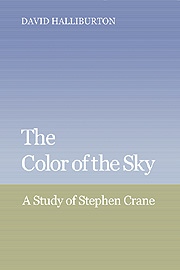Book contents
- Frontmatter
- Contents
- 1 Introduction
- 2 The Little: Early Writings
- 3 Conflict as Condition: Maggie: A Girl of the Streets
- 4 Doing Without: George's Mother
- 5 Eternal Fact and Mere Locality: The Red Badge of Courage: An Episode of the American Civil War
- 6 The Mysteries of Heroism and the Aesthetics of War: Army Tales and Other War Writings
- 7 Community and Crisis: “The Monster,” Tales of Whilomville, “The Blue Hotel,” “The Bride Comes to Yellow Sky”
- 8 The Ethics of Their Condition and the Unreal Real: “The Open Boat,” “The Five White Mice”
- 9 The Farther Shore: Poems
- Notes
- Index
6 - The Mysteries of Heroism and the Aesthetics of War: Army Tales and Other War Writings
Published online by Cambridge University Press: 06 July 2010
- Frontmatter
- Contents
- 1 Introduction
- 2 The Little: Early Writings
- 3 Conflict as Condition: Maggie: A Girl of the Streets
- 4 Doing Without: George's Mother
- 5 Eternal Fact and Mere Locality: The Red Badge of Courage: An Episode of the American Civil War
- 6 The Mysteries of Heroism and the Aesthetics of War: Army Tales and Other War Writings
- 7 Community and Crisis: “The Monster,” Tales of Whilomville, “The Blue Hotel,” “The Bride Comes to Yellow Sky”
- 8 The Ethics of Their Condition and the Unreal Real: “The Open Boat,” “The Five White Mice”
- 9 The Farther Shore: Poems
- Notes
- Index
Summary
Crane's attitude toward war in general and heroism in particular is reminiscent of the little man's attitude toward the mountain. War and heroism all but mesmerize. To behold a specific heroic deed, or a tissue of collectively heroic deeds, is to be captive to awe, and what inspires awe is mystery. The source of inspiration is not normally charisma, so far as this term implies personal leaderhsip of an ostensibly inspired nature. With some exceptions Crane's military heroes are followers more than leaders, and when they lead, as in the case of young Henry in The Red Badge of Courage and old Henry in “The Veteran,” they do so in a manner at once spontaneous and nonhierarchical. For Crane as for Garland, the ordinary fighting man is a type: “The common soldier of the American volunteer army had returned. His war with the South was over, and his fight, his daily running fight, with nature and against the injustice of his fellow men was begun again. In the dusk of that far-off valley his figure looms vast, his personal peculiarities fade away, he rises into a magnificent type.”
Larger than life, such types invite an evocative, admiring treatment, the texture and tenor of which we find subsumed within an aesthetics of war.
MIGHTY SPIRIT
Many years after his own return, the common soldier who became a brave color-bearer occupies a position of respect in his hometown, the setting of “The Veteran.”
- Type
- Chapter
- Information
- The Color of the SkyA Study of Stephen Crane, pp. 145 - 181Publisher: Cambridge University PressPrint publication year: 1989

